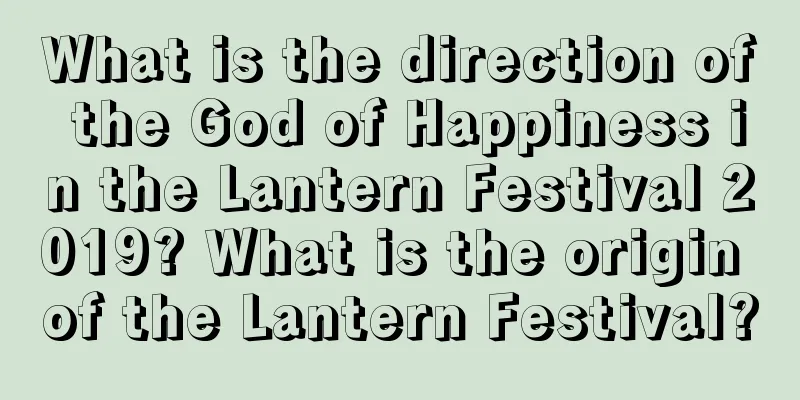What is the direction of the God of Happiness in the Lantern Festival 2019? What is the origin of the Lantern Festival?

The Lantern Festival, also known as the "Shangyuan Festival" and "Yuanxiao Festival" in ancient times, so what is the direction of the God of Joy for the Lantern Festival in 2019? What are the legends about the origin of the Lantern Festival? The key to a good year begins in spring. For more knowledge about the first month of the lunar calendar, please pay attention to the 2019 first month of the lunar calendar special topic on Shuimoxiansheng.com.Query the location of the God of Happiness for the Lantern Festival in 2019:The 15th day of the first lunar month of the year 2019 (Lunar calendar)February 19, 2019, Tuesday, Pisces (solar calendar) 【Today’s lunar calendar is suitable】 Pray for blessings, get married, move, bring in wealth, move into a new house, build a stove, accept a bride price, recruit a son-in-law, offer sacrifices, fast and offer sacrifices, build houses, pray for an heir, break ground, take up a post, erect pillars, plant, sign certificates, catch and enroll in school [Today's taboos in the old almanac] Repair graves, bury beds, cut wood, raise beams, take in livestock, build houses, start drilling, travel meridians, break ground, open business. Position of the God of Wealth: God of Happiness: Due South God of Fortune: Due East God of Wealth: Southwest The direction of the God of Happiness for the Lantern Festival in 2019 is due south. When worshiping the God of Happiness, you can choose the time based on the auspiciousness and inauspiciousness of the time according to the almanac. The auspicious and inauspicious time of the Lantern Festival in 2019 according to the old almanac:Zi hour (23:00-00:59): Gengzi [unlucky]Chou time (01:00-02:59): Xin Chou [auspicious] Yin time (03:00-04:59): Ren Yin [unlucky] Mao time (05:00-06:59): Guimao [unlucky] Chen time (07:00-08:59): Jiachen [auspicious] Si time (09:00-10:59): Yi Si [unlucky] Noon (11:00-12:59): Bingwu [auspicious Xunkong] Wei time (13:00-14:59): Ding Wei [auspicious ten-day period] Shen time (15:00-16:59): Wushen [unlucky] You Hour (17:00-18:59): Jiyou [Unlucky] Xu time (19:00-20:59): Gengxu [unlucky] Hai Hour (21:00-22:59): Xin Hai [Auspicious] The origin and legend of the Lantern Festival:The fifteenth day of the first lunar month is the Lantern Festival, also known as the Shangyuan Festival, Yuan Ye, and Lantern Festival. The first month of the lunar calendar is the first month of the year. The ancients called the night "xiao", so the fifteenth day of the first month is called the Lantern Festival. The fifteenth day of the first lunar month is the first full-moon night of the year. It is also the night when a new year begins and the earth returns to spring. People celebrate this night, which is also a continuation of the celebration of the New Year. Sima Qian created the Taichu Calendar and listed the Lantern Festival as a major festival. It flourished during the Sui, Tang and Song dynasties.Yuanxiao originally meant "the night of the Lantern Festival". Because the main activity of the Lantern Festival on the fifteenth day of the first lunar month is eating glutinous rice balls and admiring the moon at night, the name of the festival later evolved into "Lantern Festival". When the Lantern Festival was in its early stages of being a festival, it was only called the fifteenth day of the first lunar month, the middle of the first lunar month, or the full moon. After the Sui Dynasty, it was called Yuan Xi or Yuan Ye. Influenced by Taoism in the early Tang Dynasty, it was also called Shangyuan, and it was occasionally called Yuanxiao in the late Tang Dynasty. But since the Song Dynasty, it has also been called Dengxi. In the Qing Dynasty, it was called the Lantern Festival. 1. Commemorating the “Ping Lü” Legend has it that the Lantern Festival was established during the reign of Emperor Wen of Han to commemorate the "suppression of the Lü clan." After the death of Emperor Gaozu of Han, Liu Bang, Liu Ying, the son of Empress Lü, ascended the throne as Emperor Hui of Han. Emperor Hui was cowardly and indecisive by nature, and power gradually fell into the hands of Empress Lü. After Emperor Hui of Han died of illness, Empress Lü took control of the government and turned the Liu family's empire into the Lü family's empire. The old ministers in the court and the Liu family were deeply indignant, but they were afraid of Empress Lü's cruelty and dared not speak out. After Empress Lü died of illness, the Lü clan became extremely worried and fearful of being harmed and ostracized. So, they secretly gathered at the home of General Lu Lu and conspired to make a rebellion in order to completely seize the Liu family's kingdom. This matter reached the ears of Liu Xiang, the King of Qi, who, in order to protect the Liu family's kingdom, decided to lead an army to attack the Lü clan. He then contacted Zhou Bo and Chen Ping, two of the founding ministers, and designed a plan to remove Lü Lu. Finally, the "Lü Rebellion" was completely put down. After the rebellion was quelled, the ministers supported Liu Bang's second son Liu Heng to ascend the throne and he was called Emperor Wen of Han. Emperor Wen felt that peace and prosperity were hard-won, so he designated the fifteenth day of the first lunar month, the day when the "Lu Rebellion" was quelled, as a day to celebrate with the people. Every household in the capital decorated their homes with lanterns and streamers to celebrate. From then on, the fifteenth day of the first lunar month became a folk festival celebrated throughout the country - "Lantern Festival". During the reign of Emperor Wu of Han, the sacrificial activities for "Taiyi God" were set on the fifteenth day of the first lunar month. (Taiyi: the god who dominates everything in the universe). When Sima Qian created the "Taichu Calendar", he had already designated the Lantern Festival as a major festival. 2. Torch Festival The Lantern Festival is a traditional Chinese festival since ancient times. The Lantern Festival began when ancient people held torches in the countryside to drive away insects and animals, hoping to reduce pests and pray for a good harvest. To this day, people in some southwestern China still make torches out of reeds or branches on the fifteenth day of the first lunar month, and dance in groups in fields or threshing grounds with torches held high. It flourished during the Sui, Tang and Song dynasties. There were tens of thousands of people participating in the singing and dancing, which lasted from dusk to dawn and ended at dusk. With the changes of society and times, the customs and habits of the Lantern Festival have undergone great changes, but it is still a traditional Chinese folk festival. 3. Taoism’s “Three Elements Theory” The custom of lighting lanterns during the Lantern Festival originated from the Taoist "Three Yuan Theory"; Shangyuan means the first full moon night of the new year. The origin of the Lantern Festival is recorded in "Miscellaneous Notes on the Seasons" that it is due to the old customs of Taoism. Taoism once called the fifteenth day of the first lunar month the Shangyuan Festival, the fifteenth day of the seventh lunar month the Zhongyuan Festival, and the fifteenth day of the tenth lunar month the Xiayuan Festival, collectively known as the "Three Yuans". The Five Pecks of Rice Sect, an important Taoist sect in the late Han Dynasty, worshipped the God of Heaven, the God of Earth, and the God of Water. They believed that the God of Heaven bestowed blessings, the God of Earth pardoned sins, and the God of Water relieved disasters. They also paired the three officials with the Three Yuans, saying that the God of Heaven was born on the fifteenth day of the first lunar month during the Shangyuan period, the God of Earth was born on the fifteenth day of the seventh lunar month during the Zhongyuan period, and the God of Water was born on the fifteenth day of the tenth lunar month during the Xiayuan period. In this way, the fifteenth day of the first lunar month is called the Lantern Festival. In the Southern Song Dynasty, Wu Zimu said in "Dreams of the Southern Song Dynasty": "The Lantern Festival on the 15th day of the first lunar month is the day when the Heavenly Official of the Shangyuan Festival bestows blessings." Therefore, lanterns must be lit on the Shangyuan Festival. : : : : : : : : : : : : : : : : : : : : : : : : : : : : : : : : : : : : : : : : : : : : : : : : : : : : : : : : : : : : : : : : : : : : : : : : : : : : : : : : : : : : : : : : : : : : : : : : : : : : : : : : : : : : : : : : : : : : : : : : : : : : : : : : : : : : : : : : : : : : : : : : : : : : : : : : : : : : : : : : : : : : : : : : : : : : : : : : : : : : : : : : : : : : : : : : : : : : : : : : : : : : : : : : : : : : : : : : : : : : : : : : : : : : : : : : : : : : : : : : : : : : : : : : : : : : : : : |
<<: Is the 30th day of the first lunar month in 2019 an auspicious day?
>>: Is the 27th day of the first lunar month in 2019 an auspicious day?
Recommend
Is it possible to renovate on the 27th day of the seventh lunar month in 2022? What should we pay attention to when starting renovation?
In the seventh month of the lunar calendar, fruits...
What is the fate of a girl born on September 13th of the lunar calendar? Born to be a lucky wife?
Introduction: We all know that the direction of de...
Is it not suitable to get engaged on the fourth day of National Day in 2019? What hardware do you refer to for engagement?
Introduction: Generally, you have to choose a good...
Auspicious days for haircuts in June of the lunar calendar in 2021
The June sun scorches everything, and the dog days...
Can I move house on the 17th day of the lunar calendar in 2017? Is it the day to move into a new home?
1. What day is June 17th in the lunar calendar 20...
Is it a good idea to get married on October 23, 2020, the day of Frost’s Descent? Is it advisable to nourish meat on the day of Frost’s Descent?
Introduction: Getting married is one of the import...
Is June 13th a good day for the Great Heat in 2021? Is this an auspicious day for moving house?
The sixth month of the lunar calendar belongs to t...
Is it good to get pregnant and have a baby during the Beginning of Autumn? Do people born during the Beginning of Autumn have good personalities?
Introduction: Every day a new life is born and a n...
Is it advisable to seek wealth but not to open the market on the third day of the first lunar month in the Gengzi Year of 2020? What are the auspicious and inauspicious events?
Every day has its good and bad luck, as well as th...
Is it good for a baby boy born on the first day of September in the lunar calendar in 2019?
Is it good for a baby boy born on the first day of...
Where is the God of Wealth on May 26, 2017? What is the direction of the God of Wealth?
The fifth month of the lunar calendar is the firs...
Is September 29th of the lunar calendar in 2021 an auspicious day? Can I install a new bed?
In the ninth month of the lunar calendar, the grac...
What does "Ten days before the autumnal equinox is not too early, and ten days after the autumnal equinox is not too late" mean? What proverbs are there for the Autumnal Equinox?
The "fen" in Autumnal Equinox means half...
Is it a good idea to repair graves today, Qingming Festival in 2020? What kind of paper should be burned during tomb sweeping on Qingming Festival?
Introduction: Repairing graves is an important mat...
Will there be tolls during Qingming Festival in 2021? Introduction to free high-speed time in 2021
There will also be toll exemptions on special holi...









